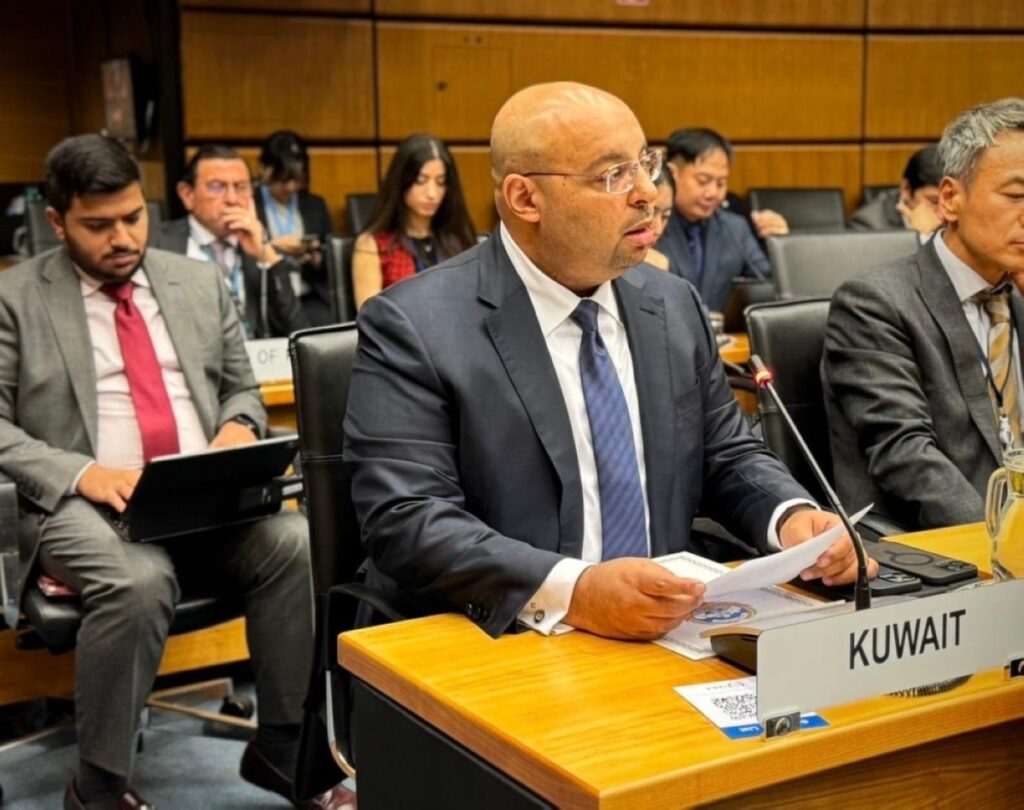VIENNA: Kuwait emphasized on Friday the importance of international accountability regarding Zionist nuclear capabilities, calling for all its nuclear facilities to be placed under the International Atomic Energy Agency’s (IAEA) comprehensive safeguards system. The statement was delivered by Kuwait’s Ambassador to Austria and Permanent Representative to the International Organizations in Vienna, Talal Al-Fassam, during the IAEA Board of Governors meeting under the agenda item “Other Business” concerning Zionist nuclear capabilities.
Ambassador Al-Fassam affirmed Kuwait’s support for the Arab Group’s position and reiterated the IAEA’s central role in verifying the peaceful nature of nuclear programs. He noted that all countries in the Middle East comply with the Treaty on the Non-Proliferation of Nuclear Weapons (NPT) and implement the Comprehensive Safeguards Agreement, except Zionist entity, which continues to refuse oversight and resists initiatives to establish a nuclear-weapon-free zone in the region.
The envoy recalled past resolutions, including UN Security Council Resolution 487, the 1995 NPT Review Conference, and the 53rd IAEA General Conference in 2009, highlighting Zionist non-compliance and the ongoing threat posed by its nuclear program. Concluding his remarks, Al-Fassam stressed the necessity of keeping Zionist entity’s nuclear capabilities on the Agency’s agenda until concrete measures are implemented, paving the way for a Middle East free of nuclear weapons and enhancing regional and international security.
Support for Palestine
Meanwhile, Kuwaiti Assistant Foreign Minister for European Affairs Ambassador Sadiq Marafi reaffirmed Kuwait’s steadfast support for the Palestinian cause during the first meeting of the Palestine Donor Group (PDG) in Brussels. He stressed Kuwait’s commitment to securing the legitimate rights of the Palestinian people, including the establishment of an independent Palestinian state with East Jerusalem as its capital, based on the June 4, 1967 borders and international law.
Marafi highlighted Kuwait’s backing of initiatives led by Saudi Arabia, France, the US, Qatar, Egypt and Turkey to implement the Gaza conflict resolution plan endorsed by UN Security Council Resolution 2803. He also praised the European Union for hosting the event and lauded international efforts to ensure Gaza’s financial stability and recovery. Marafi called on the global community to address the root causes of the humanitarian crisis in the occupied Palestinian territories and hold Zionist entity accountable for its violations of international law and humanitarian principles. The PDG meeting, convened by the European Commission and co-chaired by EU Commissioner for the Mediterranean Dubravka Suica and Palestinian Prime Minister Mohammad Mustafa, brought together ministers and senior officials from 60 countries and international organizations. Kuwait was represented by Ambassador Marafi and his delegation.
Constructive engagement
At the United Nations, the Gulf Cooperation Council (GCC) Group highlighted the importance of active member-state participation in the UN80 initiative, aimed at strengthening and streamlining the UN system. Jassim Al-Amri, Second Secretary of Kuwait’s Permanent Mission to the UN, delivered the statement on behalf of the GCC during a General Assembly session on the initiative’s action plan. Al-Amri described the plan as a key framework for transparency, coordination, and accountability across the UN system. He stressed the need for regular consultations, clear timelines, and member-state oversight on proposals for regional initiatives, integrated platforms, and UN country team restructuring.
He emphasized that implementation of these measures should align with member-state mandates, and expressed the GCC’s readiness to support proposals enhancing regional commissions and UN operational capacities. Launched in March, the UN80 initiative focuses on operational efficiency, evaluation of member-state mandate implementation, and structural reforms. The General Assembly endorsed the initiative in July without a vote, aiming to strengthen the effectiveness and coherence of the UN system. — KUNA

